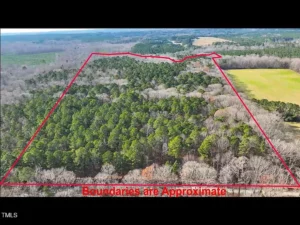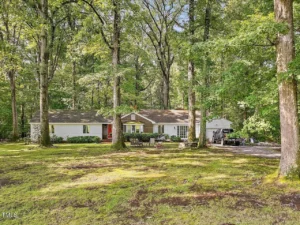It happens more often than you think. A relative dies leaving their estate behind to the remaining family members. If there’s no will that clearly outlines how the estate should be divided, it’s up to the beneficiaries to amicably come up with a solution. If you find yourself in this situation, have a listen to this video where Eric reviews some scenarios.
Interviewer: Why is estate law so important?
Eric: A lot of our business is either referred to us by attorneys, especially estate attorneys, but unfortunately, I mean, it’s one of the main reasons why people sell. Mom and dad passed away, I got this land, me and my two brothers own it. I live in California, never heard of Chatham county. They have no anchors or relation to North Carolina. And so they’ve inherited this land and now they’re going to sell. So the most important thing that I can convey on this video is you have to make your plan today. Tomorrow’s not good enough. Hopefully you live for a very, very long time, but the bus thing can happen. And could leave your family ill prepared. And those are very unhappy thoughts. And I want everybody to live forever for a very long time. But the truth of the matter is, you’re going to die. It’s going to happen.
So we need to plan accordingly. And I run into dead ends with families so often. I can’t tell you how much work I put into properties and families and situations where they just can’t work it out. And the reason why they can’t work it out is because there wasn’t a will and there wasn’t any planning. So I sell many pieces of real estate, and I do a lot of estate work, but I do a lot of dead ends. Just today I got an email, “Eric, I have 37 acres.” She doesn’t have clear title. I cannot sell that woman’s property without clear title.
And so let me give you a couple key scenarios of what happens. These aren’t real people, but these are stories that I hear all the time. So there is no will, but Mary, the daughter, has been taking care of mama for 10 years. Steven, the son, is such a jerk he doesn’t even send his mom a Christmas card. Mary and Steven have equal shares. Mama passes away. Mary owns half, Steven owns half. Then Mary will say, “But wait, mama was so poor. She couldn’t pay her property tax. So I paid her property tax for the last 10 years. And her HVAC went out, so I replaced that for her. And she needed new roof, so I replaced that for her. So at least I get that back.” You get that back if you work it out with your brother, but brother and sister have equal shares. And that really, really gets people very upset. Most often siblings get along. I don’t have too many issues where brothers and sisters or brothers and brothers. I have a closing tomorrow, three sisters, they’re the most fun. They’re all in their sixties. They love each other. They get along great. It’s the fourth piece of land I’ve sold for them. Couldn’t couldn’t go any smoother. But dad had everything laid out.
The two things that happen most often and get real complicated are things that involve second marriages. And not all marriages work out and people get married again, some people get married three or four times. But the other situation is daddy and mama built that farm when they first got married 60 years ago. Raised all their kids. When mama died, we were surprised that daddy got married real quick, but that Louise down the road started bringing him dinners a week after mama passed. This really does happen, okay? So sure enough, daddy and Louise got married. Then daddy died just a year later, and we thought he was leaving the farm to us. Guess what? He’s married to Louise now. If he didn’t have a will, that automatically goes to his wife, Louise. And people get real, real upset because Louise is in charge. Whatever she wants to do is what she does. This happens all the time. Louise passes. This is where people get sick to their stomach. Louise passes and the entire farm now goes to her kids. And so that really, really makes for some upset. This shocks people, they just can’t believe that’s how the law works. And unless other arrangements that have made, that is how it goes down.
The other thing that we see quite often is a life estate. So daddy got remarried to Louise. He has an arrangement with her and he has an arrangement that the property is going to go to his kids. But does he really want his second wife to be homeless? No. So what he will do is he’ll grant a life estate. So Louise gets to stay there as long as she lives, and then when she passes, it can go to his kids. But again, he has an estate, he’s made a will to say otherwise.
Interviewer: And in North Carolina, even if he gives it to his kids, since he’s married, she’s eligible for a portion of it [inaudible]?
Eric: Yeah, yeah, yeah. I mean, I’ve seen every level of different arrangement that could be made, but yeah, exactly. But the number one thing that we see is the siblings are getting along fine and then the last parent passes away. And then one of the siblings’ spouses is a tad greedier than the others, and that’s where it all breaks down. This is what really tears up family. So let’s just say for the sake of argument, we have two brothers, two sisters, and they’re all married. There might be one spouse that she didn’t grow up in that house. She didn’t know mama and daddy. She might not know the brothers and sisters, but she feels as though… She’s a mama bear. She’s looking out for her kids. She wants as much as she can get for her family.
That’s where it can get really, really complicated. That spouse might be living in her husband on the coast of California. This property’s all the way in North Carolina. And then one of the sons helped out on the farm or trucking business or in the construction business. He lives in a house in two acres right next door to the house of 64 acres. So of course he’s going to want some more acreage or he’s going to want to move into the house. And so it gets very, very complicated, but it’s usually the spouse of the siblings that it’s just a powder keg and blows it up for the rest of the family. Because they’re not as vested. They didn’t grow up in that house. They didn’t know mommy and daddy for a long time.
And then the most horrific thing I say, and one of the main reasons why I wanted to do this video is things get really, really complicated when they pass several generations without a will. And this happens all the time. There’s distrust of the government. There’s distrust of attorneys. The family might be so poor that they can’t afford the legal fees. And yet things get more and more complicated. You will have four generations of one family living in a house. And that’s the house mama lived in, that’s the house mama’s mama lived in. That’s the house my great-grandmother lived in. So have four generations, so they assume, but it was never transferred. And we can have siblings in New Jersey and Chicago that they had kids and [inaudible]. They all have an equal share. Now again, and this is the single thing that people say all the time, “But we’ve been paying taxes on it for 20 years.” “Well, we’ve been fixing that up for 20 years.” “Mama’s always lived in that house. That’s her house.” No, they had an agreement, but those agreements have to be recorded. So main thing. Get a will. Make sure if you have a property without a will, it’s cleared up now instead of later because it’s just going to get more and more complicated.





